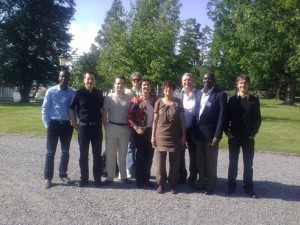Bringing Enterprise Modeling Closer to Model-Driven Development
Iyad Zikra, Janis Stirna, Jelena Zdravkovic
Enterprise Modeling (EM) provides the means for using models to represent organizational knowledge from different perspectives. When information systems (IS) are involved, Model-Driven Development (MDD) is an approach that focuses on the use of models as primary development artifacts. By observing that EM provides the context for high level requirements, which in turn are the input to MDD, we propose a meta-model that integrates enterprise models and requirements with design models in MDD. The meta-model defines six models that cover both organizational and IS development knowledge. Inter-model relationships ensure an integrated view of the enterprise and the supporting IS by allowing model components to be used across different models. The integrated meta-model is demonstrated through an example case study.
